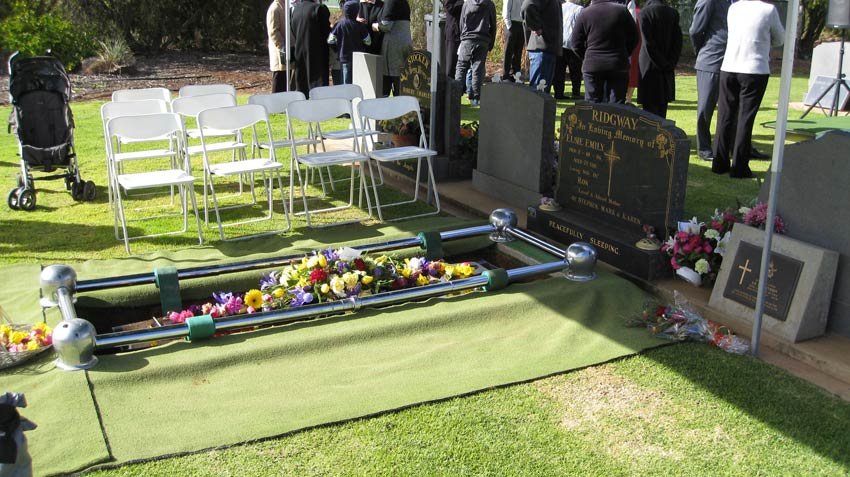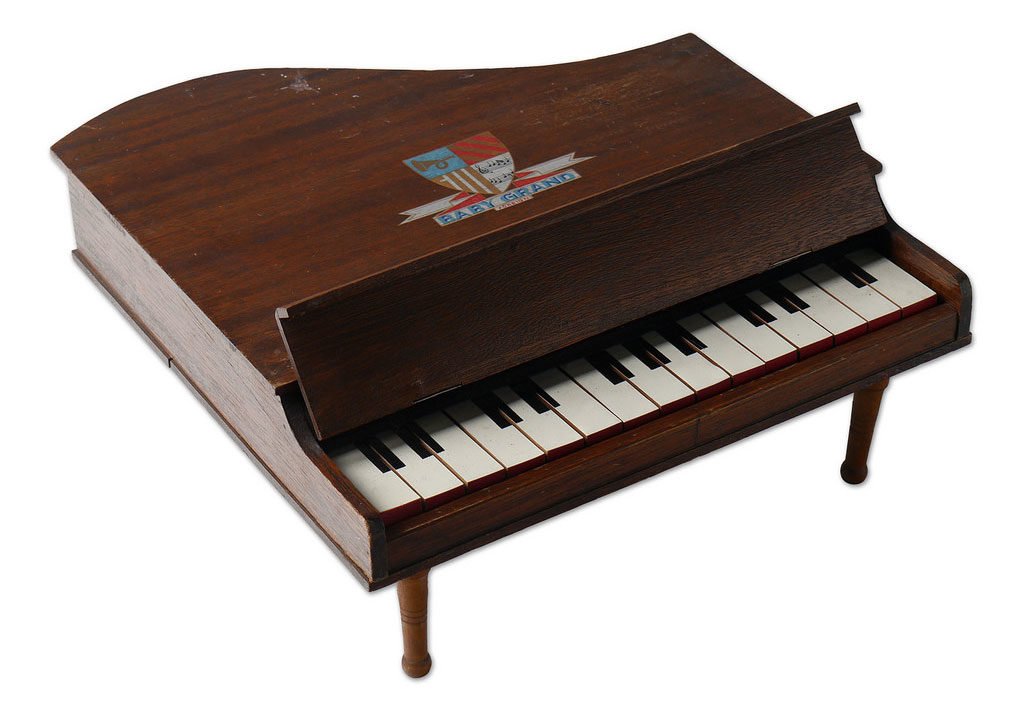I’m seven years old, and streams of people lean on the walls of the viewing room, standing in line for their turn to see my father in his coffin. I’m so close that the slippery gloss of the lacquered wood slides against my scratchy dress. The smell of lilies mixes with Mr. Clean, making the flowers seem artificial even though they’re not. The velvet lining, the shiny veneer, the bouquets, and his fancy clothes—a black suit I can’t remember ever seeing him wear—makes me wonder if the man inside is really my father.

He should have chosen a more rustic resting place. He was a man’s man, who enjoyed answering the door in his boxer shorts to shock our prim and proper next-door neighbor, Mrs. Vann. He could have worn blue jeans and a work cap, sweaty and greasy from crawling under the bellies of cars.
In the coffin, his sleeves are crossed on his chest, his missing right hand covered with more flowers. He is in costume. So am I, my fine hair slicked back, my too-tight patent leather Mary Janes pinching my toes. Are all these people waiting for me to cry on cue?
My gregarious, redheaded paternal grandmother, who was exposed to all forms of bodily unpleasantness as a nurse’s aide, pats my father’s face then says to me, “You do it.”
When I bristle and pull away, she grabs my hand and plunks it on his cheek. Even though the coroner performed his magic with make-up and chemicals to make my father look alive, one touch confirms he isn’t.
He feels like cold chicken skin.
My mother, right beside me, seems small and silent enough to disappear with my father. Her clavicle pokes out like a wishbone. If I could pull the winning half of that bone, I would wish for a cuddle in bed and the extra pillow she always fluffs under my head when I’m sick.
I withdraw my hands from the coffin as if from a lion’s mouth, then my grandmother makes my siblings, mother, and me stand together. Mourners greet us with hugs, lowered heads, and sometimes tears. I want to crouch in a corner and immerse myself in Charlotte’s Web, retreating into a story I can understand.
Eyes are on me, I’m convinced, rubberneckers at an accident. The urge to disappear, to hide from stares, absorbs me totally.
Crying would be a relief, but I can’t. All my circuits are down. I stare at my shiny shoes, at the red cushions, at a spider web in a far-off corner glistening with menace. Anything to avoid thinking about why I am there. My grandmother’s insistence that I touch my father seems ghoulish, macabre, even cruel.
Now, though, I’m grateful. If I didn’t have that visceral memory of his permanently frigid skin against the burning pulse of my thumb, his death might have become an abstraction for me. I might not have believed he was gone.
In the weeks and months that follow, my teacher, Sunday school leader, pastor, Brownies den mother, neighbors, and well-meaning relatives keep asking me if I cried. Even kids at school. I’d always been proud of being a good student, compliant and cooperative, but I keep failing to give the right answer.
I cry easily now, making up for lost time. Dinner has to come before the movie or I’ll be cutting my steak with a face covered with mascara and mucus. I cry at weddings, of course, funerals and baby showers, though I draw the line at birthday parties. I can’t finish a book in a cafe or I’ll end up blubbering in front of the barista. If someone dies in the story, you’ll hear my sobs all the way on the other side of the Atlantic.
But back then, my eyes remain dry. I worry that I’m becoming a callous kid. Thick skinned. I wish someone told me that mourning is a skill, something I could learn over time.
My first day back to church after the funeral, my Sunday school teacher asks, “How do you feel?”
“I feel bad,” I say. “I feel like I am bad” is what I mean. Bad and stubborn for not reacting the way I should.
When I finally return to school, months later, Mrs. Taylor, my second-grade teacher, turns me into an exotic specimen under a microscope. For show and tell we sit crisscross applesauce in a circle on the braided rug next to her desk. She allows everyone else to talk about their Christmas vacations. Laura got a pogo stick. Michael got a BB gun. Kim’s cat had kittens, black and white with little mitten paws. Kim holds up a picture. “We went door to door to give them away,” she says.
“Aw,” we coo collectively.
“Roy, it’s your turn,” Mrs. Taylor says. “You got a new baby sister for Christmas, right?” We all know his mother lives down the street from her.
“But that’s not what I asked for!” Roy says, and Mrs. Taylor laughs that sweet tea laugh of hers, ladylike sounds careful never to burst out of their corsets. We kids don’t laugh. We don’t want a baby sister either.
Round and round the circle we go. Maybe if I sit completely still she’ll skip me. I stare at the frilly cursive alphabet above the chalkboard, each letter with a picture, A for apple, Z for zebra. Inspirational posters, one with a kitten dangling from a tree advising us to “Hang in There.” A bulletin board with scenes of sleds and snowmen proclaiming “Winter Wonderland.” Another board with our mitten-shaped state surrounded by water, with a cut-out of the Frosted Flakes mascot. “Tony the Tiger says The Great Lakes are Gr-r-r-r-eat!” On the far wall near our coat rack hangs a poster of John Wayne saying “Courage is being scared to death, but saddling up anyway.”
“Children, you know Sharon’s been absent several months. You know why, right? Her father went up to heaven to be with the angels. Can you tell us about that, sweetheart?”
I stare at John Wayne, dumb.
Mrs. Taylor waits. Saunters over to me, hands on hips, bracelets jangling, her heavy lilac perfume making me stifle a sneeze. “It’s your turn now. Tell us.” Her voice shines a spotlight on me.
“I got a toy piano for Christmas,” I say.
“Oh, honey. That’s not what I meant. Tell us about your daddy.”
I don’t want to. But I can’t tell her that. I can’t say anything.

“Do you feel sad?” Mrs. Taylor asks, her jeweled reading glasses dangling around her neck, her voice tinged with age and a lingering Southern accent, like so many people I know, Midwestern transplants from Appalachia.
“Yes,” I finally say, because I can tell that’s the right answer. I don’t really know how I feel, but now I would call it numb. I don’t cry, and I know this disappoints people, so I try. I owe them that. Envelopes with cards and money arrive in the mail, their charity making me feel poor.
In the story I tell myself about returning to school for the first time, my father’s premature death turns me into a tragic children’s book character. Think Snow White, Cinderella, Hansel & Gretel, James and the Giant Peach. My daughter Ella tells me it’s a cliché to begin a children’s book with a parent dead on the first page, it happens so much. The authors seem to be telling their readers, “Count yourself lucky. At least you’re not an orphan.”
Likely my second-grade teacher, by spotlighting me, was trying to get me to open up, to acknowledge my feelings, as part of the grieving process. I am sure she meant well. But what it felt like to me then was that she was trying to say to the rest of the class, “Stop complaining you didn’t get what you wanted for Christmas. At least you’re not her.”
The story I didn’t tell my class, about what I got for Christmas, goes like this.
My family doesn’t have enough money or space for such an extravagant gift, but I’m delusional. I want a grand piano. I don’t specify, secretly expecting an upright. On Christmas morning I unwrap a tiny instrument. Light enough to lift with one hand.
I didn’t ask for a toy.
I leave my mother and the afterschool snacks she placed on the table, then climb up on my flimsy piano bench, still near the Christmas tree. “It’s not real,” I say to no one. Then I stomp and break the leg, my breath coming quick and shallow and loud. Finally, I’m able to cry.

Share this post with your friends.

